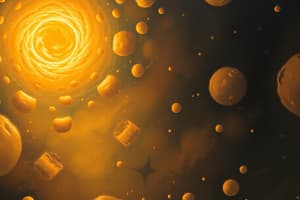Podcast
Questions and Answers
What is the main characteristic that defines matter?
What is the main characteristic that defines matter?
- Anything that is visible
- Anything that has energy
- Anything that has mass and volume (correct)
- Anything that has color
Which particles are found in the nucleus of an atom?
Which particles are found in the nucleus of an atom?
- Neutrons and positive ions
- Protons and electrons
- Protons and neutrons (correct)
- Electrons and neutrons
How is the shape of a liquid determined?
How is the shape of a liquid determined?
- By the pressure applied
- By the container it is in (correct)
- By its temperature
- By its volume
Which state of matter has no definite mass, volume, or shape?
Which state of matter has no definite mass, volume, or shape?
What do all atoms have in common?
What do all atoms have in common?
The plasma state of matter is typically characterized by which property?
The plasma state of matter is typically characterized by which property?
What distinguishes a solid from a liquid?
What distinguishes a solid from a liquid?
Which of the following is NOT a phase of matter?
Which of the following is NOT a phase of matter?
What is the primary building block of matter?
What is the primary building block of matter?
In which state of matter do atoms exist in an excited state?
In which state of matter do atoms exist in an excited state?
Which particle in an atom carries a negative charge?
Which particle in an atom carries a negative charge?
What determines the shape of a gas?
What determines the shape of a gas?
Which state of matter has a definite volume but no definite shape?
Which state of matter has a definite volume but no definite shape?
What is the charge of neutrons?
What is the charge of neutrons?
Which of the following describes solids?
Which of the following describes solids?
What are the primary components of an atom?
What are the primary components of an atom?
Which of the following phases of matter does NOT have a definite shape or volume?
Which of the following phases of matter does NOT have a definite shape or volume?
What characterizes the motion of atoms?
What characterizes the motion of atoms?
Flashcards
Matter definition
Matter definition
Anything that has mass and volume, and is composed of atoms and molecules.
Atom Structure
Atom Structure
Atoms have a central nucleus containing protons (positive) and neutrons (neutral), with electrons (negative) orbiting the nucleus.
Solid
Solid
A state of matter with a definite shape and volume.
Liquid
Liquid
Signup and view all the flashcards
Gas
Gas
Signup and view all the flashcards
Plasma
Plasma
Signup and view all the flashcards
Proton
Proton
Signup and view all the flashcards
Neutron
Neutron
Signup and view all the flashcards
What makes up matter?
What makes up matter?
Signup and view all the flashcards
Atom's core
Atom's core
Signup and view all the flashcards
Atom's orbiters
Atom's orbiters
Signup and view all the flashcards
Solid state
Solid state
Signup and view all the flashcards
Liquid state
Liquid state
Signup and view all the flashcards
Gas state
Gas state
Signup and view all the flashcards
Plasma state
Plasma state
Signup and view all the flashcards
Why is plasma special?
Why is plasma special?
Signup and view all the flashcards
The phases of matter
The phases of matter
Signup and view all the flashcards
Study Notes
Matter
- Matter is anything that has mass and volume
- Examples of matter include cups, pens, and erasers
- Matter is often defined as anything composed of atoms and molecules
- Matter is made up of protons, neutrons, and electrons
Structure of Matter
- The atom is the fundamental building block of matter
- All substances are made of atoms
- Atoms are in constant motion
- Combinations of atoms create millions of materials with diverse properties
Atoms
- Atoms consist of protons, neutrons, and electrons
- A diagram of an atom shows a central nucleus with electrons orbiting around it
Nucleus
- Atoms have a central nucleus; a positively charged center
- The nucleus contains protons (positive charge) and neutrons (no charge)
Electrons
- Electrons orbit the nucleus
- Electrons carry a negative charge
Structure of an Atom (Details)
- Atoms are incredibly small, measured in picometers (~10⁻¹⁰ cm)
- Nuclei are even smaller, measured in femtometers (~10⁻¹⁵ cm)
- Electrons are much smaller than the nucleus and are also extremely small (< 10⁻¹⁶ cm); they're orbiting the nucleus.
- Quarks are even smaller fundamental particles that make up protons and neutrons.
Phases of Matter
- Matter exists in four phases: solid, liquid, gas, and plasma
- Each phase has unique characteristics
Solid
- Solids have definite mass, volume, and shape
Liquid
- Liquids have definite mass and volume, but no definite shape. They take the shape of their container.
Gas
- Gases have definite mass but no definite volume or shape. They completely fill their containers.
Plasma
- Plasma is an excited state of matter, often found in stars due to nuclear fusion
- Examples of plasma on Earth include lightning, auroras, and neon lights
Studying That Suits You
Use AI to generate personalized quizzes and flashcards to suit your learning preferences.




